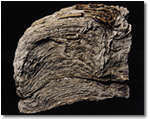[/caption]
How did life on Earth arise? Scientific efforts to answer that question are called abiogenesis. More formally, abiogenesis is a theory, or set of theories, concerning how life on Earth began (but excluding panspermia).
Note that while abiogenesis and evolution are related, they are distinct (evolution says nothing about how life began; abiogenesis says nothing about how life evolves).
Intensive study of the Earth’s rocks has turned up lots and lots of evidence that some kinds of prokaryotes lived happily on Earth about 3.5 billion years ago (and there’re also pointers to the existence of life on Earth in the oldest rocks). So, if life arose on Earth, it did so from the chemicals in the water, air, and rocks of the early Earth … and in no more than a few hundred million years.
Because there are no sedimentary rocks older than about 3.7 billion years (and no metamorphic ones older than about 3.9 billion years), and because the oldest such rocks already contain evidence that there was life on Earth then, testing abiogenesis theories must be done by means other than geological.
There is a long history of attempts to create various organic molecules – such as amino acids – from simple precursors such as carbon dioxide, ammonia, and water, in conditions which simulate those of the early Earth. Those of Miller and Urey, in 1953, are the most famous (and the first).
It turns out that it’s pretty easy to form many kinds of organic molecules, in a wide range of environments … so the focus of research today is on how life could arise from any particular brew. And the hard part is how reliable self-replication get going (if you can make some sort of primitive cell in a test tube, it isn’t a form of life if it can’t reproduce itself!). So far, it seems that RNA and DNA cannot have been involved (too hard to form and stay stable), but several simpler kinds of molecules may work.
Well, that’s one hard part; another is how can a stable bag of chemicals form? (There have been some exciting recent discoveries which may help answer at least part of this question).
A different approach – than reproduction – to finding the key to how life got started involves asking how metabolism arose; how can a bag of chemicals take in ‘food’, process it (to supply energy to all the other chemical processes going on in the bag), and get rid of the waste?
The TalkOrigins website has a summary of abiogenesis, though it is now somewhat dated (much has happened in just the last three years)!
Abiogenesis in its strict sense (origin of life on Earth) is a bit off the track for Universe Today; however, conditions under which life might spontaneously arise, on other planets (etc) is not. Some Universe Today stories on this are Sub-surface Oceans In Comets Suggest Possible Origin of Life, Add Heat, Then Tectonics: Narrowing the Hunt for Life in Space, and Has Liquid Water Been Detected on Mars?

